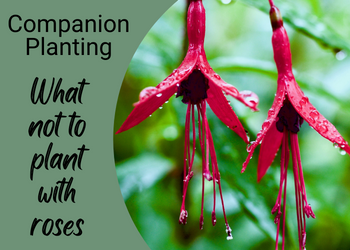I’ve already written about what companion plants you can place alongside your roses. But what not to plant with roses, alongside them, or near roses?
So here I’m going through what those plants are, and why you shouldn’t really place them as companion plants to your roses.
Here’s the list of what not to plant with roses, then I’ll explain why each might be an issue.
Flowers and plants not to grow with roses
- Fuchsia
- Bunchberry
- Toad lilies
- Leopard plants
- Canna lilies
- Ferns, shrubs, bushes, and trees
Salad and Vegetables not to grow with roses
- Figs
- Tomatoes
- Potatoes
- Eggplants
- Peppers
- Lettuces, arugula, and other salad greens
Let’s go through the list in a little more detail and explain more, but start with what to watch out for.
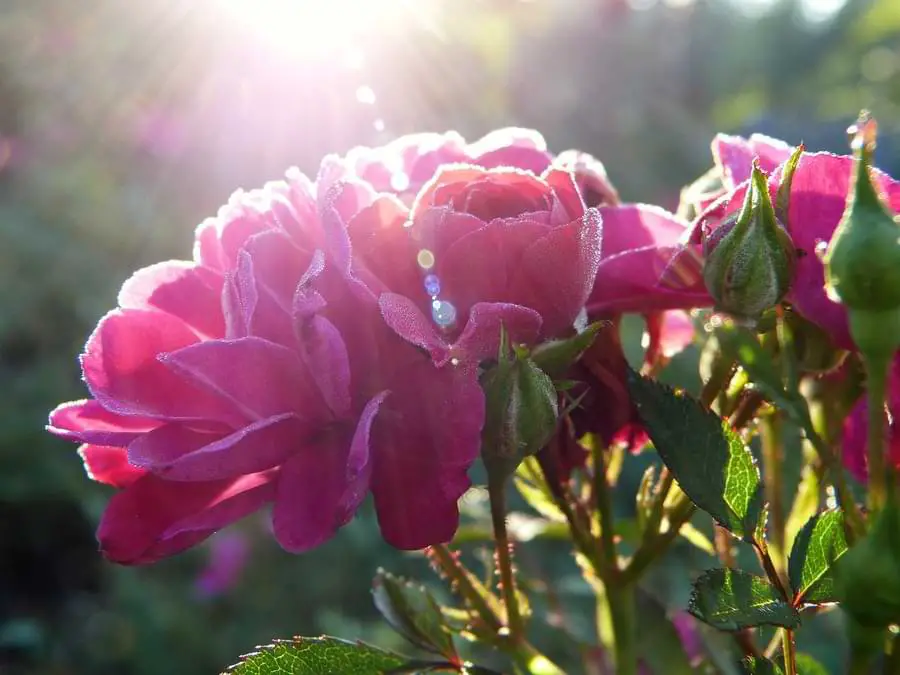
What NOT to plant with roses
So when thinking about what not to plant with roses, to better understand what works well with roses, it’s important to think about what roses prefer and align any companion plants, fruits, vegetables, herbs, etc, with those requirements.
Assuming you’ve matched your roses to your USDA growing zone, then here’s a quick rundown of what roses generally like in order for them to thrive.
Roses ideally need some fundamentals in order to thrive. These include:
- Full sun for around 6 hours per day
- A loamy Soil mix
- Slightly Acidic soil of around 6.0
- Well Drained soil more than wet soil
- Space for roots to gather all nutrients
- Airflow around the bush to prevent mildew
- Roses do not like to be overshadowed
Plants like large shrubs, bushes, and trees should be avoided because they do tend to not only block out sunlight but will develop large root systems that will compete too much with the roses for resources and nutrients.
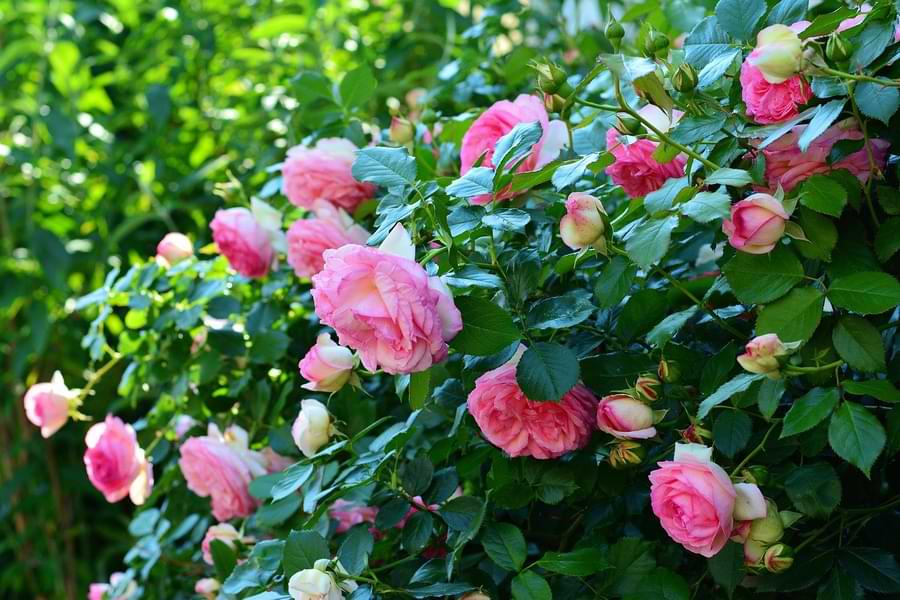
Plants and flowers not to plant with roses
Other flowers and plants are more likely to be the type of plants that you’re likely to put around or near your roses. So I’ll go through those first.
Fuschia
The fuchsia plant is a flowering plant that can get up to 6 feet tall. It has small, bell-shaped flowers that are pink, purple, or white. They’re a popular choice for gardens and containers.
Aside from the height of the fuschia that might overshadow your roses, they are also flowers that prefer shade as a requirement for them to thrive. As well as moist rich soil, which is not the best environment for roses to thrive.
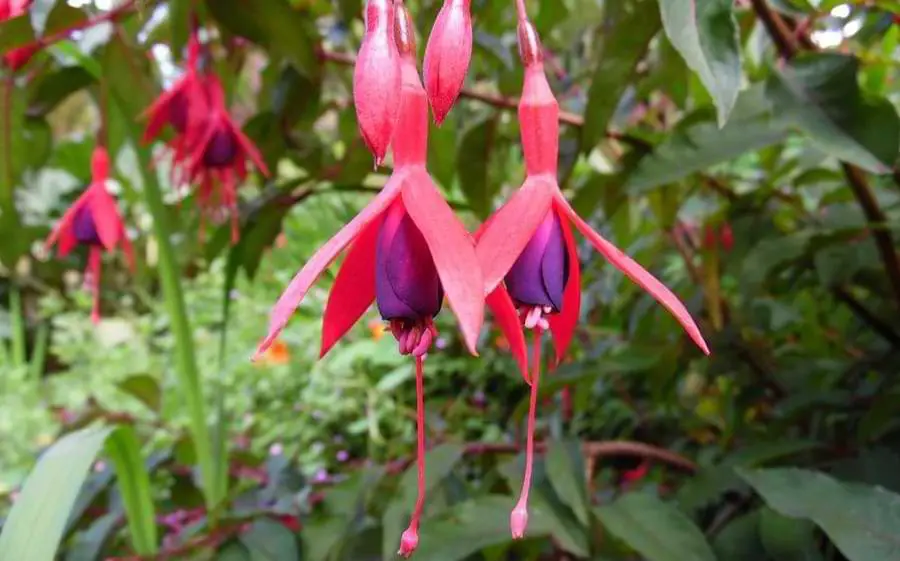
Bunchberry
The bunchberry is a low-growing plant with white flowers and red berries. It’s native to North America and Europe.
The bunchberry does well when planted in well-drained soil like roses. But they are thirsty plants and so will require a lot of water needs. As well as a lot of shade, which again would not suit roses.
Toad lilies
Toad lilies are a member of the lily family and they’re native to Asia. They have beautiful flowers that come in a variety of colors including pink, purple, blue, and white.
While toad lilies prefer moist soil, they can also grow in well-drained soil. However, they require partial to full shade. More than a little, or dappled shade does not help roses to thrive. So planting these together may not be the most effective.
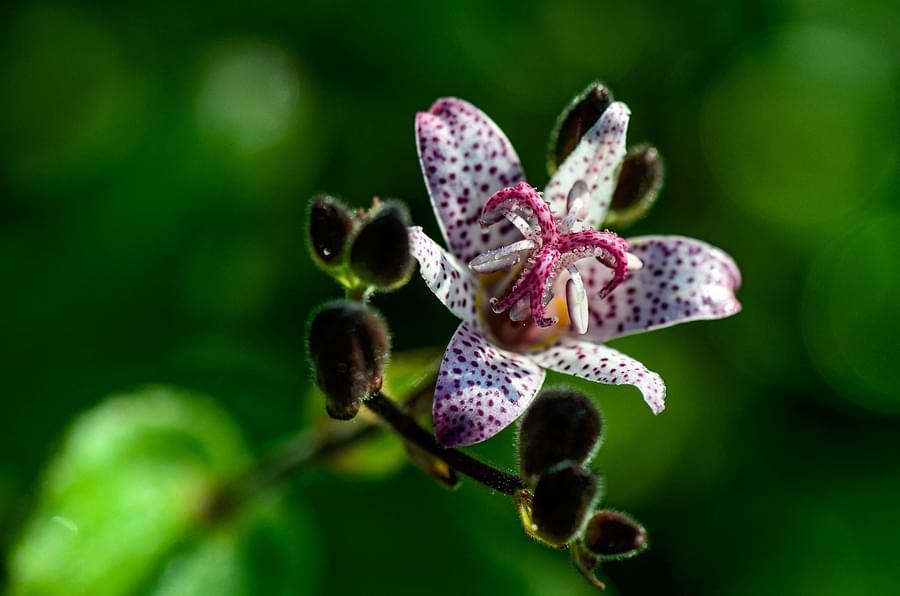
Leopard plants
Leopard plants are native to Central and South America. They have dark green leaves with yellow spots and beautiful orange flowers.
Leopard plants do best in moist, well-drained soil that is rich in organic matter, so they do prefer more alkaline soil. They also prefer partial shade – but can tolerate full sun as long as they have enough water. So they will monopolize available water in the ground that your roses might need.
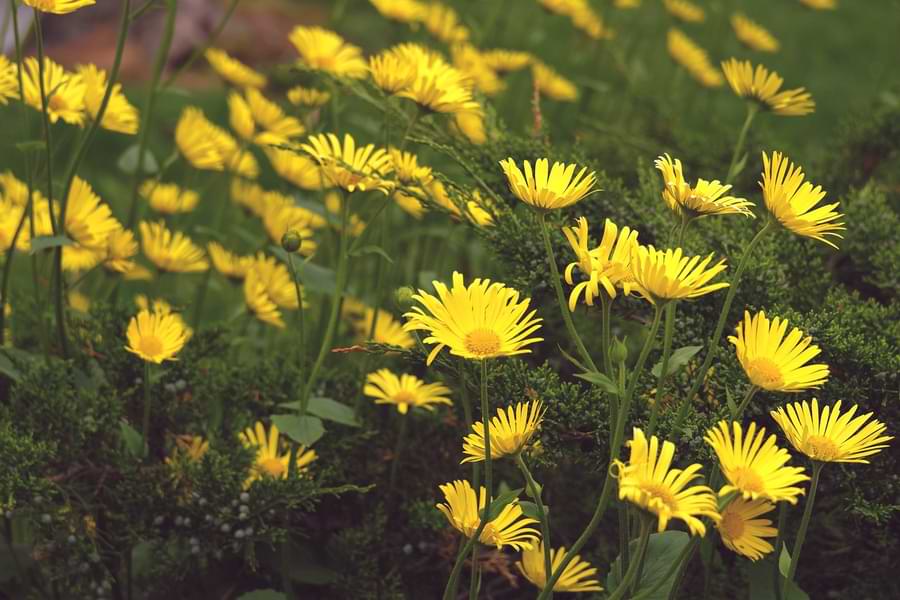
Canna lilies
These beautiful tropical plants are native to South America but have been cultivated all over the world. They come in a range of colors including yellow, orange, pink, and red.
They can reach heights of 2-3m (6-10ft), so make sure you plant them well away from your roses!
While they are spectacular plants, they are not the best companions for roses. They have very aggressive root systems that will quickly compete with your roses for water and nutrients. They also tend to spread rapidly, so they can easily overrun your rose garden.
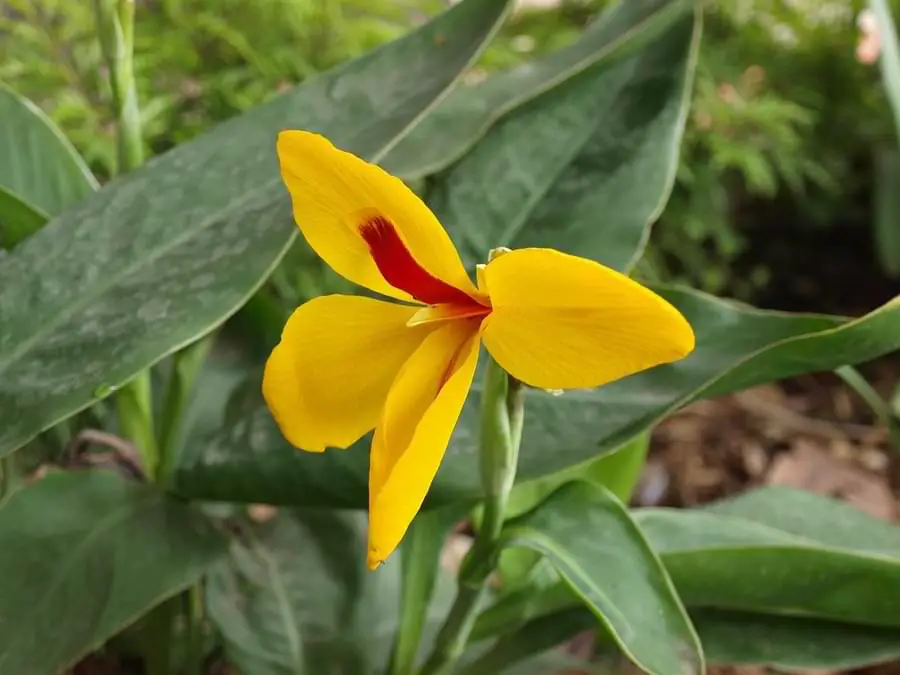
Ferns
Ferns are a type of flowering plant that reproduce using spores instead of seeds. They are found in a wide range of habitats, from tropical rainforests to mountainous regions.
Ferns make poor companions for roses as they are very aggressive growers. Their roots can quickly compete with your roses for water and nutrients, and they can also spread rapidly and take over your rose garden.
However, with a bit of space either space around the rose bush, then you can consider boxwoods and roses together as an alternative.
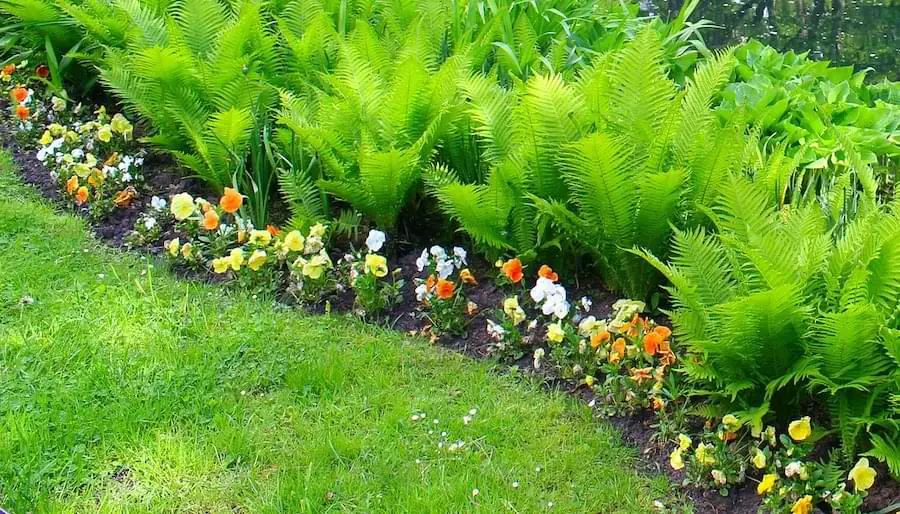
Salads and vegetables not to plant with roses
I’ll look at some individually and I’ll also add some together that pose the same issues when planting next to or near roses.
Figs
Figs are known to produce a substance called ethylene gas, which speeds up the ripening process of fruit. This gas can also cause roses to bloom too early, and their flowers may not be as long-lasting. You can find a complete list of these food products here.
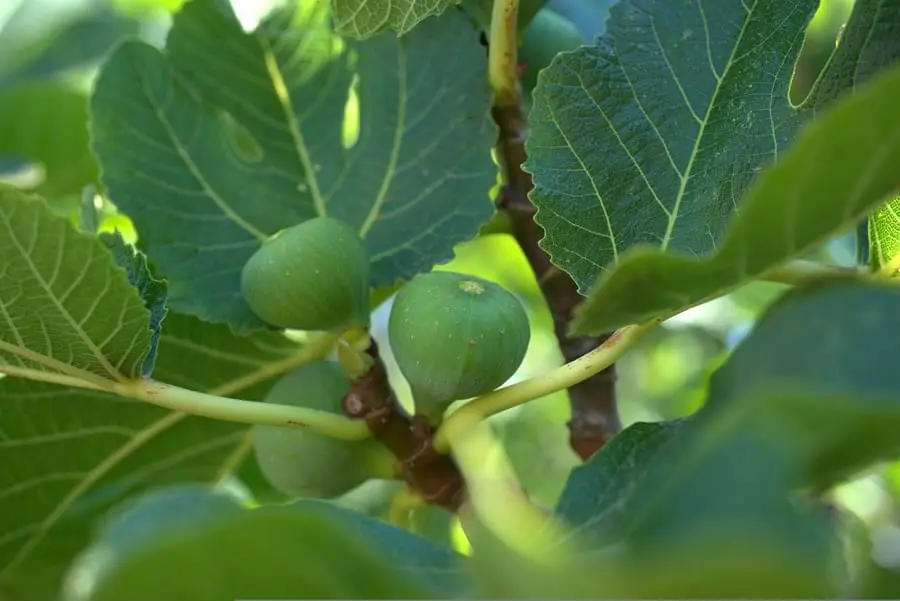
Tomatoes
These are all members of the nightshade family. These plants produce a substance called tomatine, which is toxic to roses. Tomatine can cause rose leaves to curl and turn brown.
Potatoes, eggplants, and peppers
are all plants in the nightshade family. They produce a toxin called solanine that is harmful to roses. So it’s best not to plant them near each other.
If you really want to grow these plants, I would suggest planting them in a different area of the garden, or at least several feet away from your roses.
Salads such as lettuce and arugula
These do not make good companions for roses. The leaves of these vegetables are often attacked by aphids, which then spread to the roses.

What to plant with rose bushes and roses instead
Aside from my complete post on the best companion plants for roses, here are some other plants that you can plant with rose bushes or around your roses.
Vegetables that grow well alongside roses include onions, garlic, and chives. These plants help to repel aphids and other pests that can damage roses.
Herbs such as basil, rosemary, and oregano also make good companions for roses. They not only help to deter pests but also add a nice flavor to your garden.
What NOT to plant with roses ~ More roses help 🌹
I hope this has provided some key information on what not to plant with roses, as well as some options for the best plants to grow with roses.
Be sure to check out my other articles for more roses help!

Hi, I’m Michael. My passion for roses was sparked a few years ago after visiting a dedicated community rose garden. So Rosehow.com represents my take, my learnings, and my help for anyone looking to grow, be proud of, and harvest roses.

